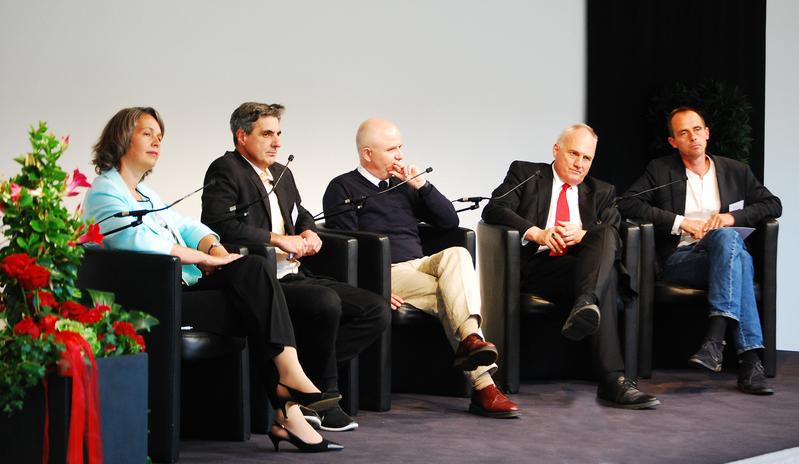

In 2014 the Green Summit brought international experts from German-speaking countries, Europe and the United States to Liechtenstein.
University of Liechtenstein
The Green Summit 2015 links themes of sufficiency in relation to such areas as foodstuffs, energy and building, of which the synergy effects and potential for the future are still too little known. In an ecological context, the term sufficiency (from the Latin sufficere, to be sufficient) stands for the endeavour to keep the consumption of non-renewable raw materials and energy media as low as possible.
The Green Summit focuses both on new agricultural models and socially sufficient initiatives, and on autonomous resources and forms of energy supply in architecture and urban development. Other items on the agenda are the use of renewable forms of energy in real estate finance, and possibilities of development in this rapidly changing field.
Diet – municipal development – renewable energy
In industrial countries food and living accommodation are on the one hand still viewed as luxury goods, while on the other they are taken for granted. For the majority of the human race there is no assurance that these basic existential needs can be supplied. In view of steadily rising consumption on the basis of non-renewable resources, the natural habitat of our planet is endangered. This short-sighted appropriation of profits by the few on the one hand, and the need to ensure the biological survival and broad prosperity of the many on the other, are the main items on the programme of this year’s Green Summit. Subjects discussed will include life in cities, populated areas and regions in relation to food, growth and energy and resource-autonomous ownership.
Day 1: international experts
On Tuesday, 9 June 2015, there will be a general sharing of views by regional and international experts. Questions such as ‘Who are the opinion leaders and players involved?’ and ‘Where are investment potential and possible returns to be found?’ will be addressed. Two bestseller authors of the ecology movement have been prevailed on to give keynote speeches. These are Dr Felix Prinz zu Löwenstein [Prince of Löwenstein], author of ‘Food Crash’ and prominent advocate of a global bio-revolutionary movement, and Dr Greta Taubert, author of ‘Apokalypse jetzt!’ [‘Apocalypse Now!’], who is embarking on a one-year trial with herself as guineapig to investigate the world of dropouts, visionaries and utopians, and find out how she could cope with life after the crash and how much she really needs to live.
Day 2: regional initiatives
10 June offers an open forum for all and sundry – both big and small players, experts and lay persons, schoolchildren and parents, industrial magnates, politicians and non-profit organisations. Here the most recent regional sustainability initiatives will be presented – along with workshops, practical advice for daily living, campaign recruitment and a ‘sufficiency’ of entertainment. Under the motto ‘Seed for the Future’, outstanding initiatives towards a sustainable Alpine Rhine Valley region will be introduced, with the aim of making their work better known on this platform of the University of Liechtenstein and providing a basis for their networking with other initiatives.
Sponsors and partners
The Green Summit has been able to acquire Zurich Insurance, the Laura and Lorenz Reibling
Family Foundation, Taurus Investment Holdings Boston and the REHAU Group as sponsors. Network partners supporting the 2015 sustainability summit are the organisations EAROPH, Environmental XPRT, DDS Consulting Group and the European Urban Knowledge Network.
Green Summit 2015
Tuesday, 9 June and Wednesday, 10 June 2015, both days from 8.30 am to 7.00 pm
Vaduz, Auditorium and Foyer of the University of Liechtenstein
Bookings and information at www.uni.li/greensummit












